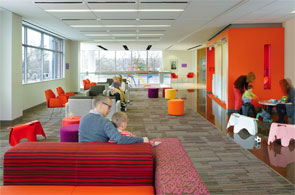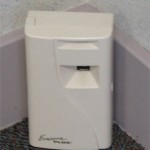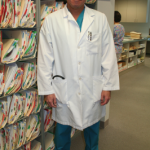
Furniture should be selected to provide support for patients who have difficulty with overly soft seating.
Image Credit: Courtesy Perkins+Will/Ken Hayden
immunosuppression, research has proved that music raises pain thresholds and is effective in significantly increasing immunoglobulin A (IgA) antibodies, which is key in providing defense [against] various infections,” Ms. Woodworth says.2
Research shows that what type of music is most successful varies greatly. “Considering the rheumatoid population can be broad in terms of age and condition, the provider might offer a choice of music via an inexpensive iPod,” Ms. Woodworth says. “Silence is an option, but keep in mind that when ambient noise isn’t offered, every sound grabs attention. Ambient noise generated by television has its plusses and minuses, and can be especially negative if the programming does not filter out potentially stressful stories that are popular in our sensationalist-oriented news environment.” Practitioners can alleviate this by using closed circuit television or simply offering the TV as a monitor for movies that patients can choose.
Dr. Wei’s welcome area features a large-screen television that rotates his short videos (about one-and-a-half minutes long) on different topics, such as how acupuncture might help certain conditions and the side effects of inflammatory drugs. “They are short, to the point and visually appealing,” he says.
He advises against music. “You hear it so often, it can be irritating,” Dr. Wei says. Instead, he suggests soothing sounds, such as birds chirping.

This device emits a pleasant smell
courtesy Nathan Wei
Pain Therapy Associates’ waiting area has a flat-screen TV that plays DVDs featuring beaches, waves, fish, deserts and canyons, accompanied by soothing music. “Patients find the DVDs very relaxing,” Ms. Roberts says. “In fact, many patients ask for the DVD titles so they can go out and purchase them.” In an effort to portray a family atmosphere, the practice doesn’t show medical videos.
Although the other senses are not as dependent on rheumatoid patients’ sense of well-being, offering water or other refreshments sends the message that you care while your patients wait, Ms. Woodworth says.
Ms. Roberts says staff offer coffee or water to every patient. In fact, the practice’s medical director, Carey Dachman, MD, FACR, DAAPM, gets it for patients, who are often pleasantly surprised by this.
Dr. Wei says the olfactory sense is often overlooked. His welcome area features the Encore Plus Metered Dispenser System that emits a subtle, pleasant smell. Employees offer beverages, including bottled water (the favorite) and, sometimes, coffee, tea or juice.


